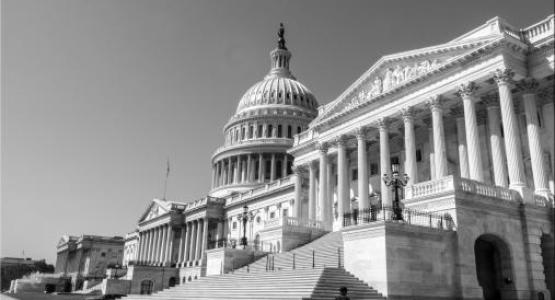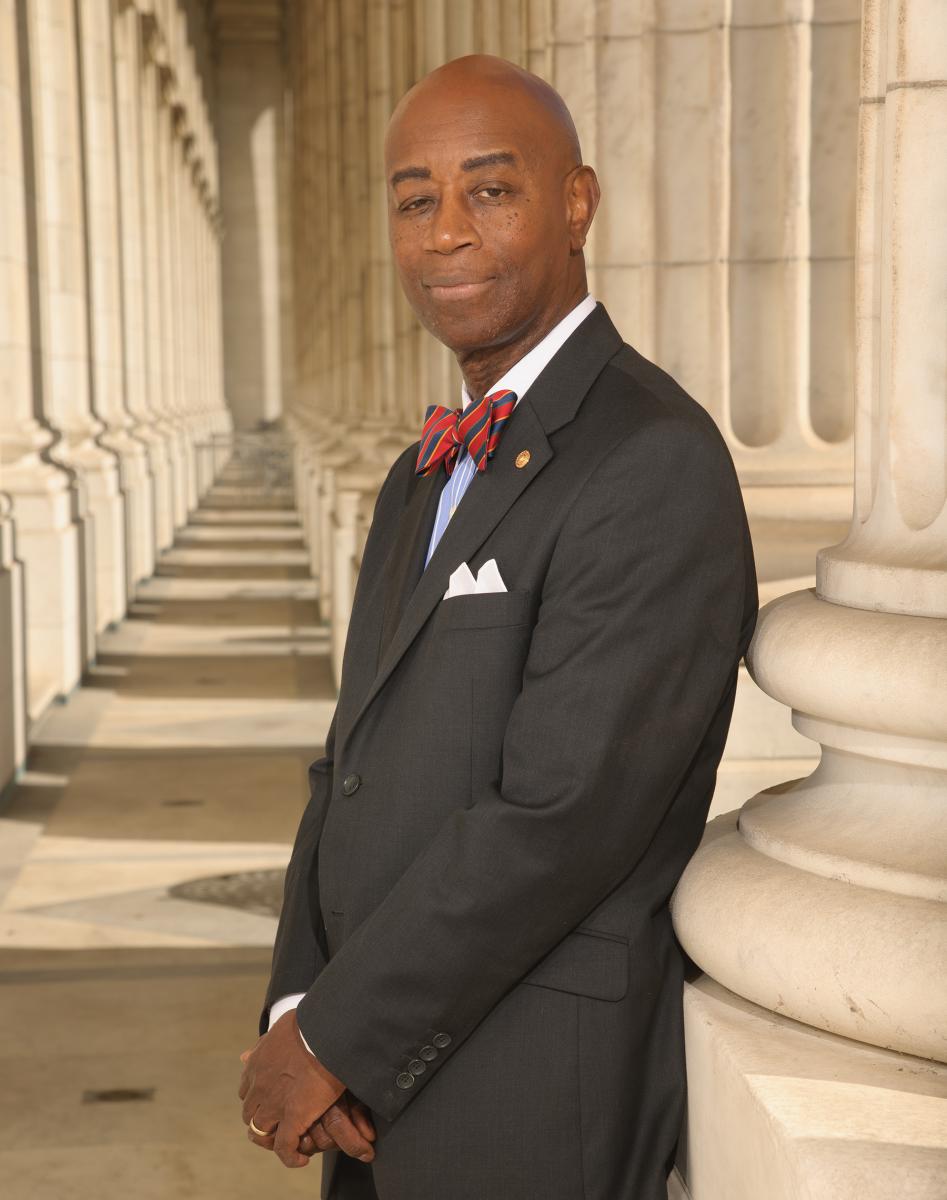
U.S. Senate Chaplain Barry Black Reflects on Two Decades of Service
When Barry Black was 8 years old, his mother, who was a domestic worker, received a record of one of Peter Marshall’s sermons—the 57th chaplain of the United States Senate. Black listened to it repeatedly and memorized the whole sermon.
“God knew that somewhere down the road … I would be a successor to Peter Marshall; heaven decided to have some fun,” says Black, who is now the 62nd U.S. Senate chaplain and the first Seventh-day Adventist to serve in that role.
This year, as he marks two decades in this position, Black reflected on his journey to and on the Hill.
Black stepped into his role as Senate chaplain in 2003, coming from 27 years as a Navy chaplain.
It was never a question for Black whether he wanted to be a preacher or be involved in ministry. With a passion for working with youth, he did not initially foresee Senate chaplaincy—but God had other plans.
Black’s mother was baptized as a Seventh-day Adventist when she was pregnant with him, he says, and in that moment, she prayed for the Holy Spirit to anoint her unborn child as well.
How Did Adventism Impact Black?
The greatest contribution Adventism specifically made in Black’s life, he says, was an Adventist Christian education.
“I believe that the Seventh-day Adventist Christian education system is second to none,” Black says.
Along with his seven siblings, Black received Adventist education from elementary school at Allegheny East Conference’s Baltimore Junior Academy to Pine Forge Academy in Pennsylvania all the way up through Oakwood and Andrews universities. Even after studying at prestigious schools, including Harvard and Princeton, Black said he would put Adventist schools “up against anything.”
Noting Adventist education’s strong impact on his entire family, he says several of his siblings have worked in Adventist education. “When we go to family reunions, it is like a Bible Bowl,” with family members dropping Scripture, followed by the chapter and verse—something he does in his rhythm of speaking.
He credits Adventist education for helping him cultivate a biblical worldview, which he uses to this day, adding that the purpose of Christian education is “to provide prosperity to the nation by furnishing it with people qualified to act with the fear of God, reverential awe, as leaders and counselors.”
“When I minister in the Senate, I filter everything I do through the prism of the Word of God,” Black says, noting that when he provides Bible studies on the job, “everything I teach, I probably learned before I graduated from Pine Forge Academy.”
He adds, “I believe when we get to heaven, you are going to have closest to the throne of our Lord the martyrs. But I believe right next to the martyrs will be the Seventh-day Adventist church’s school teachers.”
Ministering Beyond Adventism
Black’s ministry in the U.S. Capitol is an interfaith one.
“This is the ministry that I always desired, and that is a pluralistic ministry that crosses denominational lines, and even crosses religious lines,” Black says, as he looks at a photo in his office of himself with the Dalai Lama, and another shaking hands with Pope Francis.
Part of Black’s interfaith ministry on the Hill includes providing an Imam for Muslim staffers and other workers during Islamic holy times such as Ramadan, as well as providing rabbis for the Jewish staff and senators.
“It’s a wonderful opportunity to understand what our Lord was saying in John chapter 10. ‘Other sheep I have’—not ‘I will have them,’ I already have them—they’re just not of this fold, but they’re already Mine. And they know My voice! Them must I bring, and then there will be one fold, and there will be one Shepherd,” he says.
But life as a chaplain on the Hill is not without its challenges.
Walking the talk or “manifesting ethical congruence,” is what Black says he considers his biggest personal challenge and the thing he strives most to do. He seeks to live every aspect of his life according to God’s Word.
“I have to live an inspection-proof life,” Black says. “On Capitol Hill, that’s not easy. Why? In the political arena, you have something called ‘opposition research.’”
He looked to Daniel as an example of walking the talk and finding that “inspection-proof life.”
“Daniel’s enemies in the new kingdom of Meo-Persia said of him [in] Daniel 6:5— because they had done their opposition research—‘we can find nothing against this man, excepted concerning the law of his God.’”
Nonetheless, Black says many people on the Hill are greatly spiritual and in love with Jesus and seeking after Him. One senator, he notes, has only missed one of Black’s weekly senate Bible studies in 19 years.
When he is approached with questions, Black says he draws on his Christian educational training, which taught him to answer and offer guidance based on Scripture.
“When people talk to me, I listen to what they say. I compare it with whether it agrees or disagrees with biblical admonition, and I can then bulletproof my evidence, my facts, my reasons, my questions, because they are based upon a biblical worldview, and they are based on the Word of God,” he says.
In what seems to be an increasingly polarized political climate in the U.S., with surging Christian nationalism added to the mix, Black says he finds a balance between not buying into polarization and political animosity, while still ministering and seeking to guide lawmakers and staff by first having a healthy perspective of history, and comparing history to current events, all in light of knowing that God has the whole world in His hands.
Amid the Turmoil
In the midst of the nation and world’s turmoil that is so easy to get swept up in, Black referred to Jesus’ words and teaching in Mark 4 when He calmed a violent storm on the Sea of Galilee.
Black recounts, “The disciples, who are mariners, have swallowed water. They were going down. ‘Master, don’t you care that we’re dying?’ He says, ‘Peace. Be still.’ And there are storms all around us, but He says, ‘Why were you fearful? Do you not yet have any faith?’”
Though in this life fearful storms arise, disciples of Jesus—God’s own people—can find strength and comfort in focusing on who their Master and companion is through it all. We need not be afraid or become perpetually discouraged when we focus on the One Who is with us through the hard times, rather than the difficulties themselves, says Black.


 Read & Share This Issue's Articles
Read & Share This Issue's Articles
Comments
Congratulations to Chaplain Barry Black
Barry, Brenda, Kitty, Gloria, and Beverly were my classmates at Oakwood. Barry has not changed because of his fame, wealth, and success. My home is Washington, D.C. I have lived in South Bend, IN for the past 16 years. About 10 years ago, I was in Union Station on my way back to South Bend. I caught a glimpse of Barry as he trotted through the station. I called Barry twice. Would you believe he stopped in mid trot, came over to where I was standing, and planted a kiss on my cheek. We exchanged a few quick pleasantries. Like a flash, he was gone. He is still the same old Barry. I dearly love him.
A True Man of God
As a student at Pine Forge Academy, Barry Black left his footprints that many of us attempted to follow. At Oakwood College, his footprints still lingered on campus that became even greater. Throughout his career as pastor and chaplain, his influence became powerful and far-reaching. My older brother passed away in April of this year (2023) and the last person who spoke with his on the phone was Barry Black. They had been friends at Oakwood College. That evening I received a phone call. The words - US Senate appeared along with a number. When I answered my phone, Barry's familiar voice reassured me about his conversation and prayer with my brother. Those words of comfort and prayers that he shared with my brother during his last few minutes of life meant a lot to me. In his busy schedule, he took the time to call my brother and me. A powerful witness of a "True Man of God" to everyone that he ministers to is a blessing to each of us.
Add new comment